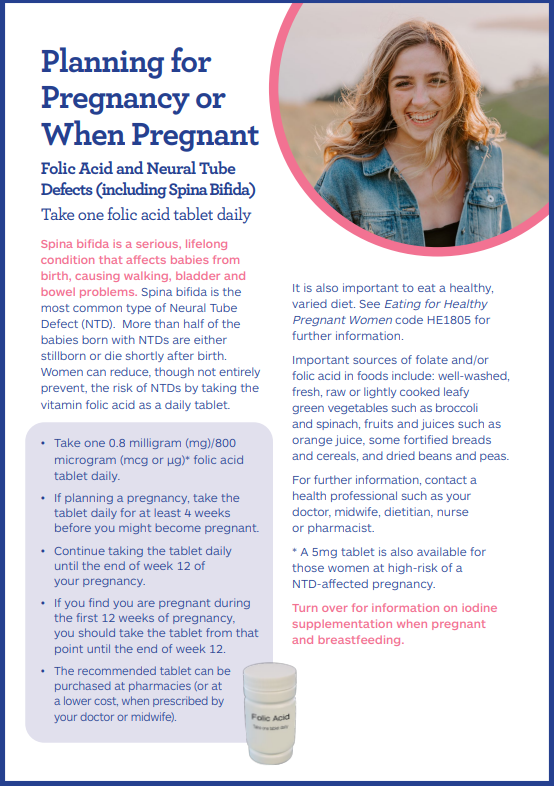You can now add Healthify as a preferred source on Google. Click here to see us when you search Google.
Folic acid and folate
Key points about folic acid and folate
- Folate is an essential B vitamin important for cell growth and reproduction.
- Folic acid is the man made (synthetic) form of folate that's added to some foods or taken as a vitamin supplement.
- Folic acid is important for the healthy development of babies in the womb, especially in the early stages of pregnancy when babies grow rapidly.
- If you're planning a pregnancy you should take a folic acid tablet for at least 4 weeks before conception and for the first 12 weeks of pregnancy to reduce the risk of neural tube defects (NTDs) in your pēpi.

Folate is one of the essential B vitamins. Folic acid is the man-made (synthetic) form of folate that's added to some manufactured foods and drinks. Folic acid may also be taken as a vitamin supplement. It's easier for your body to absorb and use folic acid than the folate naturally found in food.
Folate is important for cell growth and reproduction, and it's vital for the healthy development of babies. There's strong evidence to show that taking folic acid can help to ensure the healthy development of babies in early pregnancy. Lack of folic acid has been linked with birth defects called neural tube defects (NTDs), such as spina bifida and anencephaly.
If you don't get enough folate, your body may not be able to produce healthy red blood cells and your red blood cells may be larger than normal. This is a disorder called megaloblastic anaemia.
Folate is found naturally in foods, especially:
- green vegetables like broccoli, spinach, and salad greens
- citrus fruits and juices
- wholegrain bread and breakfast cereals
- chickpeas, nuts, dried beans, and peas (although cooking reduces the folate level).
Fortification is when nutrients are added to food and drinks during manufacturing. All manufacturers (since August 2023), are required to make bread using a flour that has had folic acid added. This is to help reduce the risk of neural tube defects (NTDs) such as spina bifida in babies.
Some breads (such as organic bread and bread made from other grains) and wheat flour not used for bread-making (such as for biscuits, cakes, pastry, and pizzas) don’t need to have folic acid added.

Image credit: Canva
Food manufacturers may also choose to add folic acid to other foods including:
- breakfast cereals
- fruit and vegetable juices
- milk alternatives, such as soy milk
- food drinks, such as liquid meal supplements
- gluten-free breads.
If folic acid has been added, you will see it listed in the ingredients as folate or folic acid. It will sometimes be on the nutrition information panel as well.
Folic acid can help to ensure the healthy development of babies in early pregnancy. Lack of folic acid has been linked with birth defects called neural tube defects, such as spina bifida.
Folate deficiency can also lead to a type of anaemia called megaloblastic anaemia.
Folate/folic acid is particularly important during pregnancy when cells are growing and dividing very quickly. If you're pregnant or planning to get pregnant it's recommended that you take a folic acid supplement (see the recommended amounts below).
Older people and people on certain medications, including anticonvulsants, may be at risk of folate deficiency and may also need to take folic acid supplements.
Folic acid is important for the healthy development of babies in the womb (uterus) – especially in the very early stages of pregnancy, when the foetus is developing. Folic acid plays an important role in the development of the neural tube. As the foetus grows, the neural tube develops into the brain and spinal cord.
Neural tube defects (NTDs) are major birth defects where the brain, spinal cord, or the covering of these organs has not developed properly.
- Spina bifida occurs when a baby’s vertebrae (spine) do not completely close around the spinal cord. Children with spina bifida can have varying degrees of complications including leg weakness or paralysis, learning difficulties or lack of bladder and bowel control.
- Anencephaly is when a baby's brain and head doesn't form properly when it's growing in the womb (uterus). Sadly, this means the baby dies before it is born or very soon afterwards.
Between 2011 and 2015, the estimated number of neural tube defects was 10.6 per 10,000 total births (live births, foetal deaths and terminated pregnancies).
Research shows that people who take a folic acid supplement before they become pregnant are less likely to give birth to a baby with a neural tube defect. Folic acid supplementation can prevent up to 70% of these defects.
 Image credit: Depositphotos
Image credit: Depositphotos
Recommended amounts for:
- Women at low risk of neural tube defects (NTDs): Take one 800 microgram folic acid-only tablet daily for at least 4 weeks before pregnancy and until the end of the first 12 weeks of pregnancy. If your pregnancy was unplanned, start taking a daily folic acid tablet as soon as possible.
- Women at high risk of neural tube defects (NTDs): Take one 5 mg folic acid-only tablet daily for at least 4 weeks before pregnancy and until the end of the first 12 weeks of pregnancy. If your pregnancy was unplanned, start taking a daily folic acid tablet as soon as possible.
You are at higher risk if:
- you've had a previous pregnancy affected by a neural tube defect
- you or your partner have a neural tube defect
- your or your partner have family members with a neural tube defect
- you're taking medicine that is known to affect folate metabolism, such as medicine for epilepsy (eg, carbamazepine, sodium valproate), tuberculosis or an autoimmune disease (eg, sulfasalazine)
- you have diabetes
- you're carrying a lot of extra weight, that is, if your body mass index (BMI) is 30 or more
- you have coeliac disease, another bowel disease with malabsorption (where you have trouble absorbing nutrients from your food), sickle cell anaemia or thalassaemia.
Folic acid tablets are available on prescription from your doctor or midwife, which is usually the cheapest option, or they can be bought over the counter at a pharmacy. Read more about folic acid supplements.
- The only supplements routinely recommended for all pregnant women in Aotearoa New Zealand are folic acid-only tablets and iodine-only tablets.
- Some pregnancy vitamins available over the counter don’t contain enough folic acid, so talk to your pharmacist when buying a pregnancy vitamin supplement.
- Some dietary supplements and multivitamins have small amounts of folic acid, but not enough to meet the required amount needed during early pregnancy.
During your pregnancy, you should still eat plenty of foods with folate in them, such as well-washed fresh, raw or lightly cooked leafy green vegetables, wholegrain breads and cereals. However, you won't get enough folate from food to prevent neural tube defects.
Folate/folic acid(external link) Health New Zealand | Te Whatu Ora
Folate and folic acid added to food(external link) Ministry for Primary Industries, NZ
Brochures
Pullout guide to food safety in pregnancy(external link) Ministry for Primary Industries, NZ
Safe and healthy eating in pregnancy(external link) HealthEd, NZ
Folic acid and spina bifida/iodine and iodine deficiency(external link) HealthEd, NZ
Behind the hype – nutrition supplements in pregnancy and breastfeeding(external link) Health Promotion Agency, NZ
Apps
References
- Nutrient reference values for Australia and New Zealand – folate(external link) NHMRC, Australia, 2017
- Folate and folic acid(external link) Health New Zealand | Te Whatu Ora, NZ, 2024
- Safe and healthy eating in pregnancy(external link) HealthEd, NZ, 2023
- Folate and the addition of folic acid to food(external link) Ministry for Primary Industries, NZ, 2023
- The health benefits and risks of folic acid fortification of food(external link) Royal Society, NZ, 2018
- Folic acid(external link) NZ Formulary
- Vena F, D'Ambrosio V, Paladini V, et al. Risk of neural tube defects according to maternal body mass index – a systematic review and meta-analysis(external link) J Matern Fetal Neonatal Med. 2022 Dec;35(25):7296-7305
Brochures

Safe and healthy eating in pregnancy
Ministry of Health and New Zealand Food Safety, 2023

Ministry for Primary Industries, NZ, updated Sept 2020

HealthEd, NZ, 2021
Credits: Healthify editorial team. Healthify is brought to you by Health Navigator Charitable Trust.
Reviewed by: Lily Henderson, Registered Dietitian
Last reviewed:





